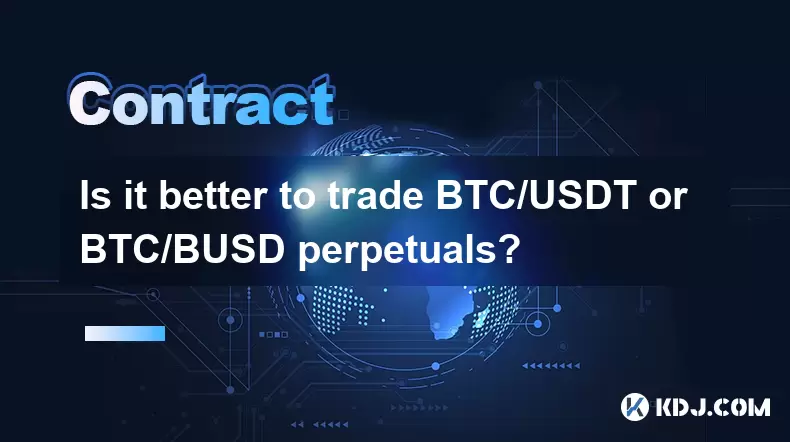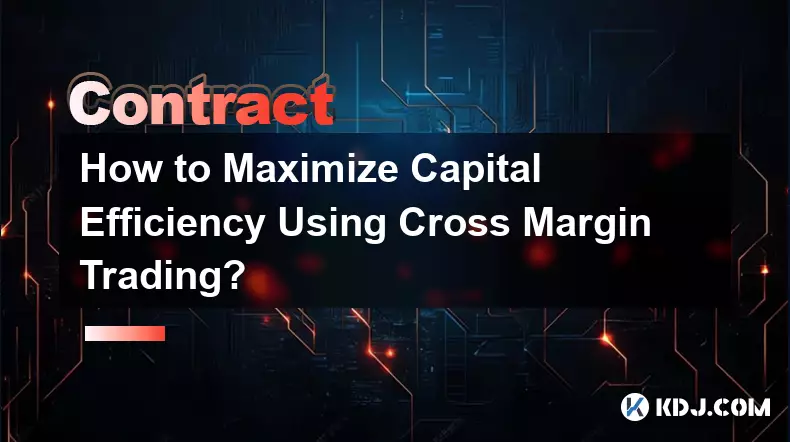-
 bitcoin
bitcoin $87959.907984 USD
1.34% -
 ethereum
ethereum $2920.497338 USD
3.04% -
 tether
tether $0.999775 USD
0.00% -
 xrp
xrp $2.237324 USD
8.12% -
 bnb
bnb $860.243768 USD
0.90% -
 solana
solana $138.089498 USD
5.43% -
 usd-coin
usd-coin $0.999807 USD
0.01% -
 tron
tron $0.272801 USD
-1.53% -
 dogecoin
dogecoin $0.150904 USD
2.96% -
 cardano
cardano $0.421635 USD
1.97% -
 hyperliquid
hyperliquid $32.152445 USD
2.23% -
 bitcoin-cash
bitcoin-cash $533.301069 USD
-1.94% -
 chainlink
chainlink $12.953417 USD
2.68% -
 unus-sed-leo
unus-sed-leo $9.535951 USD
0.73% -
 zcash
zcash $521.483386 USD
-2.87%
Is it better to trade BTC/USDT or BTC/BUSD perpetuals?
BTC/USDT and BTC/BUSD perpetual contracts allow leveraged Bitcoin trading, with USDT offering higher liquidity and BUSD providing regulatory advantages.
Jul 24, 2025 at 07:42 am

Understanding BTC/USDT and BTC/BUSD Perpetual Contracts
When considering trading BTC/USDT or BTC/BUSD perpetual contracts, it's essential to understand the nature of these instruments. BTC/USDT perpetuals are trading pairs where Bitcoin is paired with Tether, a stablecoin pegged to the US dollar. Similarly, BTC/BUSD perpetuals involve Binance USD (BUSD), another dollar-pegged stablecoin. Both contracts allow traders to speculate on Bitcoin's price without owning the underlying asset.
Perpetual contracts do not have an expiration date, unlike traditional futures contracts. Traders can hold positions indefinitely, subject to funding fees. These contracts mirror the spot price of Bitcoin and are commonly used for leveraged trading. The key difference between the two lies in the stablecoin used for settlement.
Liquidity and Market Depth
One of the most critical factors in choosing between BTC/USDT and BTC/BUSD perpetuals is liquidity. Higher liquidity means easier entry and exit from positions without significant slippage. BTC/USDT typically has higher trading volume and deeper market depth, especially on major exchanges like Binance, Bybit, and KuCoin.
This is primarily due to the longer adoption history of USDT compared to BUSD. Tether has been around since 2014, while BUSD was launched in 2019. As a result, BTC/USDT often experiences tighter spreads and faster execution, which is crucial for day traders and high-frequency strategies.
However, BUSD has seen increased adoption, particularly within the Binance ecosystem. For traders who primarily use Binance, BTC/BUSD perpetuals can offer comparable liquidity, especially during high volatility periods.
Funding Rate and Cost of Holding Positions
Funding rates are periodic payments made to either long or short traders based on the difference between the perpetual contract price and the index price. These rates ensure that the contract price stays close to the spot price.
Traders should compare the average funding rates of BTC/USDT and BTC/BUSD perpetuals. While both contracts generally have similar funding rate structures, market sentiment and open interest can cause variations. For example, during a bullish phase, long positions may pay higher funding fees in both contracts.
It's also important to consider trading fees and withdrawal costs associated with each stablecoin. Some exchanges offer fee discounts for using native tokens, which may influence the cost of trading one pair over the other.
Stablecoin Stability and Trust
Stablecoins are designed to maintain a 1:1 peg with the US dollar. However, market confidence and regulatory scrutiny can affect their stability. Tether (USDT) has faced concerns over its reserves, although it has maintained its peg for most of its history. BUSD, on the other hand, is issued by Paxos and regulated by the New York State Department of Financial Services, which may offer greater transparency and regulatory compliance.
For traders concerned about counterparty risk, BTC/BUSD may be perceived as more secure due to its regulatory backing. However, USDT remains widely accepted and is unlikely to depeg significantly in normal market conditions.
Exchange Availability and Wallet Integration
Not all exchanges offer both BTC/USDT and BTC/BUSD perpetual contracts. Binance supports both, but smaller platforms may only offer BTC/USDT due to its broader adoption. Traders should check which perpetual contracts are available on their preferred exchange.
Wallet integration is another factor. If a trader already holds BUSD in a wallet or on a platform, using BTC/BUSD perpetuals can reduce conversion fees. Conversely, if a trader uses USDT across multiple platforms, sticking with BTC/USDT avoids unnecessary transfers.
Some platforms also offer native token rewards or fee rebates for specific trading pairs. For example, Binance occasionally provides BUSD-related promotions, which may incentivize BTC/BUSD trading.
Risk Management and Leverage Options
Both BTC/USDT and BTC/BUSD perpetual contracts allow for leveraged trading, typically up to 125x on some exchanges. However, risk management tools and margin requirements may differ between the two.
Some exchanges adjust margin requirements based on the perceived volatility of the stablecoin. If a stablecoin is considered more volatile or less trusted, the exchange may require higher maintenance margins or impose stricter liquidation rules.
Traders should also consider stop-loss and take-profit execution quality in each contract. Due to higher liquidity, BTC/USDT may offer better order execution, especially during sudden market moves.
Frequently Asked Questions
Q: Can I switch between BTC/USDT and BTC/BUSD perpetuals easily?Yes, most major exchanges allow users to trade both contracts simultaneously. However, switching between them may involve stablecoin conversions, which can incur small fees.
Q: Are funding rates the same for BTC/USDT and BTC/BUSD?No, funding rates vary based on market conditions and open interest for each contract. Traders should monitor the funding rate before opening long-term positions.
Q: Which stablecoin is safer for trading perpetual contracts?While both are pegged to the US dollar, BUSD is generally considered more transparent and regulated, which may appeal to risk-averse traders. However, USDT has a proven track record of maintaining its peg despite scrutiny.
Q: Do tax implications differ between BTC/USDT and BTC/BUSD trading?Tax treatment typically depends on jurisdiction and whether the trade results in capital gains or income. Stablecoin type usually doesn't affect tax obligations, but traders should consult a tax professional for accurate advice.
Disclaimer:info@kdj.com
The information provided is not trading advice. kdj.com does not assume any responsibility for any investments made based on the information provided in this article. Cryptocurrencies are highly volatile and it is highly recommended that you invest with caution after thorough research!
If you believe that the content used on this website infringes your copyright, please contact us immediately (info@kdj.com) and we will delete it promptly.
- Bitcoin Faces Liquidity Test Amid Shifting Institutional Support Landscape
- 2026-02-05 13:05:01
- Volkswagen Tayron R-Line 7-Seater: A New Era of Luxury Family SUV Hits India
- 2026-02-05 13:00:01
- AI, Crypto Bounties, and Human Labor: The Shifting Landscape of Work
- 2026-02-05 13:00:01
- Volkswagen Unleashes the Tayron R-Line: Pre-Bookings Now Live for Flagship Seven-Seater SUV
- 2026-02-05 12:55:01
- Bitcoin Drops Amidst Analyst Warnings and Shifting Market Sentiment
- 2026-02-05 09:40:02
- The Great Stablecoin Showdown: Systemic Risk, the GENIUS Act, and the Battle for Wall Street's Future
- 2026-02-05 12:55:01
Related knowledge

How to Manage Emotions and "Revenge Trading" in Futures?
Feb 05,2026 at 12:19am
Understanding Emotional Triggers in Futures Markets1. Market volatility directly impacts psychological states, often amplifying fear or euphoria based...

How to Analyze Market Sentiment Using the Fear and Greed Index?
Feb 05,2026 at 07:40am
Understanding the Fear and Greed Index1. The Fear and Greed Index is a composite metric designed to quantify prevailing emotional states among cryptoc...

How to Use Volume Profile to Find Key Futures Entry Levels?
Feb 04,2026 at 11:39pm
Understanding Volume Profile Structure1. Volume Profile displays the distribution of traded volume at specific price levels over a defined time period...

How to Trade Bitcoin Futures with 100x Leverage? (High-Risk Setup)
Feb 05,2026 at 11:00am
Understanding Bitcoin Futures Mechanics1. Bitcoin futures contracts represent agreements to buy or sell BTC at a predetermined price and date in the f...

How to Maximize Capital Efficiency Using Cross Margin Trading?
Feb 05,2026 at 12:40am
Cross Margin Trading Fundamentals1. Cross margin trading allows traders to use their entire account balance as collateral for open positions across mu...

How to Trade Crypto Contracts During Major News Events? (CPI/FOMC)
Feb 05,2026 at 09:59am
Understanding Market Sensitivity to Macro Data Releases1. Cryptocurrency futures markets exhibit pronounced volatility during U.S. CPI and FOMC announ...

How to Manage Emotions and "Revenge Trading" in Futures?
Feb 05,2026 at 12:19am
Understanding Emotional Triggers in Futures Markets1. Market volatility directly impacts psychological states, often amplifying fear or euphoria based...

How to Analyze Market Sentiment Using the Fear and Greed Index?
Feb 05,2026 at 07:40am
Understanding the Fear and Greed Index1. The Fear and Greed Index is a composite metric designed to quantify prevailing emotional states among cryptoc...

How to Use Volume Profile to Find Key Futures Entry Levels?
Feb 04,2026 at 11:39pm
Understanding Volume Profile Structure1. Volume Profile displays the distribution of traded volume at specific price levels over a defined time period...

How to Trade Bitcoin Futures with 100x Leverage? (High-Risk Setup)
Feb 05,2026 at 11:00am
Understanding Bitcoin Futures Mechanics1. Bitcoin futures contracts represent agreements to buy or sell BTC at a predetermined price and date in the f...

How to Maximize Capital Efficiency Using Cross Margin Trading?
Feb 05,2026 at 12:40am
Cross Margin Trading Fundamentals1. Cross margin trading allows traders to use their entire account balance as collateral for open positions across mu...

How to Trade Crypto Contracts During Major News Events? (CPI/FOMC)
Feb 05,2026 at 09:59am
Understanding Market Sensitivity to Macro Data Releases1. Cryptocurrency futures markets exhibit pronounced volatility during U.S. CPI and FOMC announ...
See all articles























![KING vs PAINIFY😳 (1v1 ZONEWARS) [FORTNITE TOKEN/WAGER] KING vs PAINIFY😳 (1v1 ZONEWARS) [FORTNITE TOKEN/WAGER]](/uploads/2026/02/05/cryptocurrencies-news/videos/origin_6984035326d58_image_500_375.webp)
![2/4 [U.S. Hot Search] CIA: Xi Jinping is a paranoid | Xi Jinping’s two phone calls | Shandong’s “Internet-addicted” teenagers rebelled against tyranny | A direct attack on the Chengdu hacker national team | Why GDP must grow by 5% | The bridge under construction by the China Railway 12th Bureau collapsed | Thousands of billions of dollars spent abroad and thirty billion domestic subsidies | 2/4 [U.S. Hot Search] CIA: Xi Jinping is a paranoid | Xi Jinping’s two phone calls | Shandong’s “Internet-addicted” teenagers rebelled against tyranny | A direct attack on the Chengdu hacker national team | Why GDP must grow by 5% | The bridge under construction by the China Railway 12th Bureau collapsed | Thousands of billions of dollars spent abroad and thirty billion domestic subsidies |](/uploads/2026/02/05/cryptocurrencies-news/videos/origin_69840a757417b_image_500_375.webp)

















































